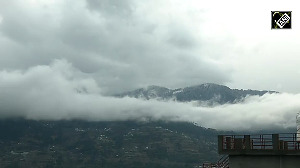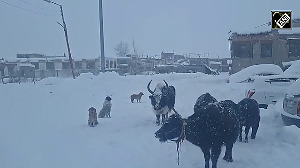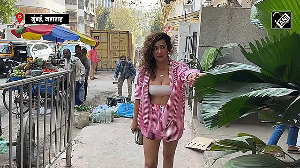Tony Jashanmal has seen it all before.
 The chief executive officer of Jashanmal National Company -- one of the biggest Indian retail and wholesale outlets in the Gulf region -- played a key role in the evacuation of 161,000 Indians from Kuwait back in August 1990 following the Iraqi invasion.
The chief executive officer of Jashanmal National Company -- one of the biggest Indian retail and wholesale outlets in the Gulf region -- played a key role in the evacuation of 161,000 Indians from Kuwait back in August 1990 following the Iraqi invasion.
He agrees there are concerns in Kuwait about what might happen if the United States-led forces launch a war against Iraqi President Saddam Hussein, but stresses there is no panic and most Indians see any future battle as limited with a return to normality as soon as possible.
The Jashanmal skyscraper is a landmark in Kuwait and Tony Jashanmal himself has been fielding questions from members of the 330,000-strong Indian community in Kuwait who remember his 1990 role of providing food, transport and shelter to tens of thousands of stranded Indians.
"Hotels are full, the restaurants are all full, people are enjoying themselves and this includes many of the people from basically these areas," he told rediff.com in a one -to-one interview at his office in Kuwait City.
"Kuwait and Saudi Arabia have their school holidays at the moment and you see the population of both countries enjoying and purchasing as normal.
"Yes, a little conversation is always there about the political upheavals in this area. But there isn't that much fear or lack of confidence.
"I personally haven't seen that much lack of confidence; conversation yes, but not lack of confidence. I even see people continuing with plans, business plans as if there is not anything very serious going on.
"Business is reacting cautiously as people do not know and are not getting great information as to what the real thoughts and intentions of the external powers are.
"They are still wondering whether the forces are here to fight a war, or whether they are here as an occupation force to see a peaceful transition for anything that is expected, or which will happen afterwards.
"The one thing everybody is convinced about is that the final intention is the removal of the Saddam Hussein regime; and everyone is probably hoping the least damage that can be done the better it is.
"Basically, people feel the forces are here to see that there is peaceful transition to, hopefully, a democratic system in Iraq. Therefore, I think most people feel that even if there is a war, it will be limited.
"There is, thus, no panic about the situation. One does not see holocaust, or destruction, or movement of people, or even long-term negative effect on the global economy.
"Most people feel whatever has to happen and whatever the intentions, it should happen sooner than later so that one can proceed to the next step."
Back in August 1990 Jashanmal was as surprised as the average Kuwaiti when Iraqis invaded their oil-rich country, sending waves of panic throughout the region.
Indians then, as now, were the largest community of foreign expatriates in Kuwait. As it became clear that the international community would use force if necessary to push the Iraqis back across the border, evacuating Indian families from a future battle zone became a top priority issue.
Jashanmal was rapidly appointed head of an executive committee that helped facilitate food, accommodation and travel out of Kuwait for Indian nationals.
As the Indian embassy was closed down at the insistence of the Iraqis who declared Kuwait was their 19th province, the executive committee became a crucial point of contact for all Indians.
"As most Indians were evacuated overland from Kuwait via Iraq to Jordan -- pending onward flights to India -- Jashanmal was also involved in co-ordinating some 15 to 16 Air-India refugee flights per day out of the Jordanian capital.
"By November 1990, every Indian had been accounted for or sent home.
"It started when I got a call from the then ambassador to Kuwait, Mr Budhiraja.
"The Iraqis wanted to secure the borders and we had a lot of construction sites, many of them close to the Saudi border, which had a lot of Indian employees and the Iraqis went there and pushed them out.
"These people came into town and asked the embassy to arrange for them to be sent back home. It was chaos with quite a few people involved. That's when the ambassador called and said he had a big problem on his hands with only enough staff to deal with the day-to-day running of the mission.
"To look after the needs of several thousand people was beyond him. Two or three of us got the community leaders together and we formed a committee to look into the matter of first these people who had been displaced and then -- in case the Iraqi invasion came about -- how to look after the rest of the community and arrange for the evacuation of all the others.
"I was the chairman of one of the schools and we started housing them in the schools. Once you do that you also start preparing food for them. Anyway, we set up a committee serving 13 areas. There were leaders for each area and then five of us became the executive committee meeting with each other on a daily basis and also with the ambassador.
"After a few days we realised the Iraqis also wanted to close down the embassy because they basically said the embassy was not relevant. We had to start taking on more and more responsibility. I was chairman of the committee for some time.
"Later we started planning the evacuation of the people and eventually we evacuated 161,000 people. We had to arrange transport, free passage, et cetera. We were concerned about the young unmarried girls, and the older people who were sick and weak. We had to get permission from the authorities to move people in large numbers. For that we needed the help of the embassy in Baghdad.
"I drove up and down several times from here to Baghdad. I know the road blindfolded. It used to take me nine hours to make the journey. It was 600 kilometres.
"There were lots of these facilities. It was good that we had several Indian food merchants and they were quite good. We managed to get food from them in the required quantities.
"We made a packet of ten products, like rice and oil, sugar, tea, dal. It was ten products and we made a packet enough to last a family of four for one-and-a-half months.
"We sold the packet for a modest 10 dinars ($30) because we needed the money to help others and keep the whole thing moving.
"Eventually we were looking after 8,000 people who were displaced and didn't have any place to stay.
"Then we had to also produce travel documents because many people's travel documents were either stuck in the ministries or their employers' offices.
"We had to produce those and get permission from the Iraqis to use photo copies because there weren't that many passports lying around in the embassy either.
"There were a lot of these things. Members of the committee worked hard, some stayed on, some left.
"When I left I also spent some time in Jordan where I found that the Jordanian relief committees were helping a lot. A lot of people got stuck in the 'No Man's Land.' At that time I met Air-India's chief Michael Mascarenhas.
"They didn't know how many people were involved. We told him so he could start planning the aircraft required and the evacuation started.
"At the time there were only a few aircraft available.
"The Jordanians helped, but they could see no end to the numbers declining. Help from the Jordanian government or Jordanian businesses started to dry up. After all, there is always a limit.
"After three or four days I went down and had lunch with the Indian business council in Dubai. Then they all started helping. Here in the desert it used to be hot, but by the middle of September in the desert at night it started getting very cold.
"We needed water in the day time for the heat and we needed blankets and tents at night for the cold. Tents, water and blankets became a priority. Our communities in Dubai, Qatar and Bahrain all helped a lot.
"What happened is that as we needed more planes, direct flights started coming in from Bombay and Delhi.
"We had 16 planes at the height. We were trying to co-ordinate 16 planes a day. Here were some jumbos, some A-320s. Then you had to co-ordinate to get the same number of people arriving.
"You needed that many buses to bring the people to the airport and get the lists organised according to the bus.
"It was quite an operation. Everyone wanted to be on the first bus and there were quite a few abuses. By November 1990 it was all finished.
They also worked well on the other side at the Delhi airport, the Bombay airport. Different states had put up their shamianas; whichever state you were from, you went there and they gave you a free ticket to travel to your state by train.
"It's amazing how in times of difficulty the Indians get together and organise. It may be messy but they still get it done."
Jashanmal does not see any parallels between the 1990 invasion and the current crisis. Because of the presence of US troops, Indians and other expatriates are convinced matters will be resolved sooner rather than later.
Some far-thinking businessmen are already looking forward to new opportunities that will arise once political change in Iraq has stabilised.
"If anybody knows anything about Iraq, it's a country with fantastic resources and therefore could pay for its development..
"And, on the other hand, it is totally dry. It needs everything from simple consumer products to food to buildings, to infrastructure, modern vehicles, everything. It's dry on everything, totally empty and void.
"If anybody has been to Iraq, like we did during the invasion, they saw the only development that had happened was in Baghdad and nowhere else. In Basra and Mosul, both of which I visited, they were totally underdeveloped.
"In Basra, where we used to have businesses, they seem to have stopped development in the last 30 years. So everything needs to be done.
"Indians could definitely play a part in the reconstruction of Iraq. Construction companies will benefit, all large companies in Kuwait will benefit from a revival of trade with Iraq."






 © 2025
© 2025